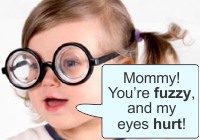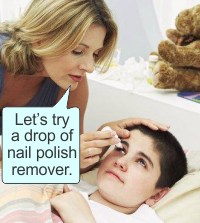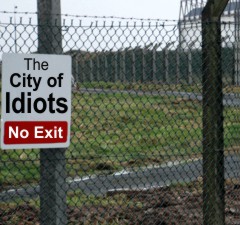What is the best
way to help defective
people?

Most people believe that the best way to take care of retarded,
poor, homeless, and other defective people is to feel sorry for them, give
them handouts of some type, and entertain them. Two examples,
The television show Extreme
Makeover: Home Edition, builds houses for people that they consider
especially wonderful citizens. However, their philosophy is that the people
who are most special and who deserve new homes are people who are giving
pity to defective children.
During every Christmas there are lots of people who want to do something
for other people. However, virtually all of these people follow the philosophy
that the people they need to help are children in poverty, and that the
way to help them is to provide them with handouts of some type, such as
toys or food. Some of the Hells Angels motorcycle riders even get involved
with "Christmas Toy Drives"!
Defective and poor people are having a much
nicer life today than they did in previous centuries, but it's not because
they are getting more pity or toys today. Rather, it's because of advances
in technology. The television show, Extreme Makeover: Home
Edition, would actually do more good for defective people if they changed
to "Extreme Makeover, Skill Center Edition"
and switched to the philosophy that the people most in need of their assistance
are those who are showing signs of intelligence, talent, responsibility,
and a desire to help society. Instead of providing homes and wheelchairs
for retarded children, they should provide schools and cities with training
centers and laboratories so that healthy, responsible, happy children can
learn about and practice with CNC equipment, robots, greenhouses, computers,
nutrition, manufacturing techniques, and other technology. Everybody
benefits as more people in society develop useful skills and increase our
knowledge about health, life, and science. Incidentally, although I have
not seen all of their episodes, I have never seen the people on the Extreme
Makeover television show using CNC equipment. Are they resisting modern
technology?
The people who believe that "Christmas Toy Drives" are helping poor
people are also fools who are wasting their time. They are also wasting
our resources by encouraging the production of toys. Those people would
also do more good for everybody - including poor children - if they would
instead have a "Christmas CNC Equipment Drive",
or a "Christmas Scientific Laboratory Drive".
When the people on the Extreme Makeover television show build
a home, they help a retarded child have a more comfortable life, but that
doesn't do the millions of other retarded
people any good. And it doesn't do anything to help the future generations
of retarded people. The people on that television show are as foolish as
a person who tosses a bag of rice to a million starving Africans. These
people praise themselves for being generous and loving, but in reality
they are fools who are wasting their time and wasting
our resources. The only way to help people is to
educate them so that they can help
themselves. Therefore, the Extreme Makeover crew, the
Hells Angels, and all of the other people who are throwing food to starving
children, should instead encourage children to develop useful skills.
Protecting Underdogs adds
a
burden to society
Consider the issue of eyeglasses. Most people have no way of
measuring their eyesight, so they have to go to a doctor to have their
eyes tested. The doctor writes a prescription for eyeglasses, and that
allows the person to purchase eyeglasses. If the person loses those eyeglasses,
he cannot walk into any retail store that offers eyeglasses within an hour
and get an instant replacement because he needs a prescription!
But why should he need a prescription? If he remembers the strength of
his eyesglasses, why can't he just ask for it? This is an especially annoying
problem if the person is traveling
at the time that he loses his eyeglasses. If the person is not certain
of the strength of his eyeglasses and orders the wrong value, if he is
traveling and in a rush, getting glasses that are too strong or too weak
is better than having none at all.
Furthermore, if everybody's medical information was in a publicly accessible
database, then nobody would need to wonder what strength their eyeglasses
are because it would be accessible anywhere in the world to anybody with
an Internet connection.

Eyeglasses are a restricted item in order to prevent people
from inadvertently asking for the wrong glasses, which could cause some
eyestrain. And supposedly, some people who don't have much money would
order eyeglasses by guessing at what
they or their children need. But why should we care if somebody orders
the wrong strength of eyeglasses?
A lot of women are purchasing shoes
that hurt their feet, but nobody cares about that. Actually, women are
doing more than hurting their feet, they are causing permanent
damage to their feet. Why are women allowed to destroy their
feet, but people are not allowed to purchase eyeglasses without a prescription?
Why not make women's shoes by prescription only so that we can ensure that
they are wearing shoes that are comfortable? And why are we allowing people
to get jewelry in their tongue? That
often causes infections, and sometimes it harms their teeth.
You may think that this issue has no effect on your life, but as I pointed
out in other files, humans today are like gears in a transmission. We work
together as a unit, and when some of us are doing unnecessary work, it
becomes a burden on everybody. When we have laws that require eyeglasses
be by prescription only, we are all burdened because this law requires
the retail stores to deal with additional paperwork, and government agencies
have to enforce the rules. In the case of eyeglasses, the burden is trivial,
but this is just one of many small burdens that we have to deal with. We
have thousands of unnecessary laws,
and this is creating a lot of unnecessary work for people in retail stores,
police departments, government agencies, schools, and businesses.
Every law adds a burden on society, and so we should make sure that
every law has a benefit that outweighs its burden. What is the benefit
to making eyeglasses by prescription only? And does that benefit justify
the burden? I don't think so.
We should change our philosophy and stop feeling
sorry for "Underdogs", retards, and freaks. We should provide
everybody with access to honest information about the dangers
of medical drugs, shoes, eyeglasses, and jewelry, and if an adult chooses
to hurt himself, that is his problem.
The rest of us should not feel responsible for him, or treat him like a
baby.
If we were to eliminate the unnecessary laws and paperwork, the people
who are currently wasting their time
with that burden would be able to do something more productive, or their
hours could be reduced, which would be useful for people who want to work
part-time, especially women who have children to take care of.
Most people do not need or
want
medical information
The people who are afraid of databases probably imagine that
other people will spend hours a day looking through the database, but if
we had free access to an extensive database of everybody's medical and
dental information, a lot of us would be curious and look through some
of the information, but we would soon get bored.
After our initial curiosity was satisfied, we would look in the database
only for a sensible reason, such to look at the medical and dental information
of a person that we are considering as a spouse. Nobody's privacy would
be "invaded", and nobody would suffer, other than the people who are trying
to hide something from us.
Some people are so crude that they don't even want access to their own
medical information! For example, there are a lot of people who have made
remarks that if their doctor were to discover that they have a dangerous,
life-threatening disease or cancer, they would prefer their doctor keep
the information a secret! A lot of people have trouble handling
the unpleasant aspects of reality. Many people cannot even handle criticism!
Most people behave like a primitive savage, or an animal. Why should we
design society to appease these crude people? We should design society
for healthy, advanced humans, and we should tell the crude people to keep
quiet and ignore the databases.
Don't feel responsible for
"medical Underdogs"
!

One of the reasons we restrict certain drugs to prescription-only
is to protect people from their stupidity, ignorance, incompetence, laziness,
irresponsibility, or refusal to read instructions. Also some people mix
medical information with religion, voodoo, women's intuition, gut feelings,
and hunches.
Doctors and dentists follow the philosophy that we are stupid, ignorant
jerks who must be protected. We should change our attitude. Society should
not try to protect savages. If a person is incapable of functioning properly
in society, he should be regarded as an intelligent
monkey, not as a human. These misfits should be removed, or
they should be classified as second-class citizens
who have restricted freedoms.
We should stop feeling sorry for the mentally incompetent people, misfits,
criminals, psychos, and idiots. We are not going to help ourselves or society
by feeling sorry for people whose minds are too primitive for this modern
era. The human race must evolve into
a more advanced creature that is better able to deal with this technically
advanced world.
Why are some people choking
to death on food?

News reports make it appear as if people
at random are choking to death on hot dogs. Some pediatricians
are asking for a choke-proof
hot-dog. Recently a 14-year-old boy, Colton Rhines,
(in the photo) choked to death on a hot dog during his school lunch. In
that particular news article, Colton Rhines is described as "apparently"
autistic, but I would say he is "obviously retarded", or "obviously
defective".
The choking on food is another example of the value of an extensive
database of everybody's life. We would be able to analyze the people who
have a tendency to choke to death on their food, and I suspect that we
would discover that those people tend to be genetically inferior. They
may be more like animals, which have a tendency to swallow large chunks
of food at a rapid pace rather than chew their meal and enjoy the food,
like a human. Or there may be something defective about their mouth, throat,
or eating habits.
Who is choking on food? And
why? And which foods?
When someone chokes on food, we should not react with fear,
panic, or horror. Instead, we should remain calm and analyze the situation.
We cannot solve a problem until we analyze it. Why were they choking? We
need to find out what type of food they were choking on, and the location
that they were in. Were they sitting in a chair at a dinner table? Or were
they trying to eat while walking, or driving a car? Or were they eating
while reclining in a chair, a bed, or a couch? Were they watching television,
talking to people, playing with their pet dog, talking on the telephone,
playing a videogame, or doing some other activity while they were eating?
What type of food were they eating? Was the food hard and dry, or soft
and sweet, or acidic?
Almost everybody has noticed that they might choke on their food when
somebody makes them laugh while they are eating, but that type of choking
is rarely fatal. However, after decades I noticed another reason I sometimes
choke on food. Specifically, when I am eating something that is very acidic
or spicy, such as something with lots of vinegar, orange juice, or
chili, and, in addition, when I have my head tilted
backwards while eating those foods.
Normally I do not have my head tilted
backwards when I eat. However, this can happen when I am in the process
of swallowing those types of foods and something or somebody causes me
to look upwards. Also, I can get into that position when eating outdoors
on typical patio furniture, which has a tendency to put us in a reclined
position, or if I try to eat on a couch or in a reclining chair. I have
come to the conclusion that I should not eat acidic or spicy foods while
reclining!
If we had complete surveillance of everybody all throughout the day
and night, we would notice that the choking on food is not occurring
at random. I eventually discovered that I was choking when I was doing
something that I would describe as unnatural, namely, eating highly acidic
or spicy foods while in a slightly reclined position. Our primitive ancestors
didn't eat those types of foods, and they didn't eat while reclining. Our
ancestors had a tendency to eat while sitting down, kneeling, or standing.
They didn't have patio furniture, couches, or recliners. As a result, humans
did not evolve into a creature that was designed to eat while in a reclined
position, and our throat did not evolve the ability to keep acidic or spicy
liquids away from our lungs.
A database of everybody's activities would help us uncover other patterns
with people who choke on food. I suspect that most of the people who have
died
from choking on food are simply defective people. The type of choking I
have done during my life was never life-threatening. I have never even
come close to choking on big pieces of food because I have never attempted
to swallow any giant pieces of food.
Why have I never tried to swallow large pieces of food? I don't remember
ever forcing myself to chew food, not even when I was a child. I always
chewed my food, and I chewed the food because I wanted to chew it, not
because I was frightened of choking on large pieces. So, why are some people
swallowing large pieces of food, like an animal?
I think it is because those people truly are more like animals.
Animals do not get together to socialize
during dinner, and they don't have slow, relaxed meals. They eat at a very
rapid pace, and they take large bites, and swallow the pieces quickly.
Which drugs should be freely
available to us?
Some drugs are illegal, such as cocaine, and some drugs are
legal, such as alcohol and aspirin, and lots of drugs are restricted to
prescription only. There are sensible reasons for restricting a child's
access to such dangerous items as drugs, razor blades, and electricity,
but I think adults should have access to virtually all drugs. I would restrict
everybody's access to certain dangerous items, such as radioactive elements,
poisons, and explosives, but I don't think it's a good philosophy for society
to try controlling an adults use of recreational drugs or medical drugs.
I don't think our current drug policies make any sense. For example,
aspirin, which is dangerous, is available to everybody - even children
can purchase it! - whereas marijuana, which doesn't seem to be very dangerous,
is illegal, and testosterone, which is a natural hormone that both men
and women need at certain levels, is available by prescription only. What
is the justification for providing everybody with access to the dangerous
aspirin, but restricting access to the less dangerous marijuana and testosterone?
A lot of tax money is spent in an attempt to stop ordinary people from
acquiring marijuana, heroin, steroids, Vicodin, and other drugs, and policemen
are sometimes killed or permanently injured in the process, but the people
who want those drugs are getting them anyway. So who is benefiting from
the attempt to control the drugs?
Most people react to problems
like a stupid animal
When most people experience a problem, their reaction is to
run and hide from it rather than remain calm and analyze the problem. For
example, when I was a child, we could buy spray paints and glues, but during
the 1960s and 1970s, some children began deliberately breathing the fumes
of certain glues and paints, as if they were a recreational drug. Adults
reacted by restricting access to those particular chemicals, and some companies
changed the formula they were using to reduce the chemical that the children
were using as a drug.
Although this policy may have reduced the number of children breathing
those particular chemicals, it didn't solve any problem. The children who
were attracted to that particular activity continued to have whatever problem
they were suffering from.
For another example, prior to the 20th century, marijuana was legal
in America. It was made illegal in order to... do what? What is the purpose
of making it illegal? Our restrictions on marijuana are ineffective because
the people who have strong cravings for marijuana will find a way to get
it, and if they want to abuse the marijuana,
they will abuse it regardless of what you or I say or do. We are fools
to waste our tax money and risk the lives of policemen on the futile attempt
to stop people from using - or abusing - marijuana or other drugs.
Why not make high-heeled
shoes illegal?
Why not outlaw high-heeled, pointed shoes in order to protect
women? What would you think if police were dying in an attempt to stop
women from purchasing high-heeled shoes? What would you think if gangs
were forming to sell high-heeled shoes to your wife, mother, daughter,
or sister?
Would legalizing all drugs
increase drug abuse?
Many people worry that if we were to remove restrictions on
prescription and illegal drugs, then lots of people would abuse drugs,
but consider how unrealistic that concern is. It is certainly true that
there are some people who are afraid to use drugs because they are illegal,
and those people would use drugs if we were to make them legal, but I think
they are a very small percentage of the population. I think most of the
people who want drugs are using them right now.
To understand this concept, imagine an extreme
example. Imagine that starting today, the government made all drugs legal
to all adults, and that all the drugs are subsidized
by tax money, so they are free. Imagine
that supermarkets, and other retail stores, have large bins of Vicodin,
insulin, LSD, steroids, cocaine, and all sorts of other drugs, all of which
are completely free of charge. Would you
be excited to have this freedom? Would you
pick up some Vicodin pills, or some vials of insulin? And if so, would
you use those drugs carefully, or would
you
abuse them?
Let's go one step further and assume that the government is also subsidizing
all of the alcoholic beverages and tobacco products. If you had free access
to all of those items, would you be excited? Would you pick up any of the
free beer or Cuban cigars? And if so, would use those products in
sensible
quantities, or would you abuse them?
Let's go even more extreme. Imagine
that the government picks up all of the unwanted
children from the streets and the orphanages, and puts them
in retail stores for us to use as sex slaves
or labor slaves. Would you enjoy that? If so, would you prefer to rape
the boys or the girls, or both?
What would you do if you were to
walk down a row in your local market and find bins of free Vicodin pills,
bottles of beer, unwanted children, heroin, steroids, and insulin? Which
of those items would you take home with you? And of the items that you
took home, which of them would you use in a sensible manner, and which
of them would you abuse?
Why should we protect freaks
who abuse drugs or rape children?

We currently try to stop people from raping children, abusing
drugs, or doing other destructive things, but why should we design society
from the point of view of protecting the retarded, freaky, defective, and
psychotic people from hurting themselves, or hurting us? My suggestion
is to change our philosophy and stop feeling sorry
for freaks, retards, and criminals. We should design society
according to the best-quality people.
For example, we should not "protect"
children from pedophiles; rather, we should remove
the pedophiles. There is no sense in feeling sorry for people
who don't fit into modern society. We are wasting our time and money, and
the lives of policemen, by fighting with them, putting them in jail, making
them pay fines, and trying to control them.
Adults should not be treated
like animals
The ideal society is one in which everything
is legal, and none of the adults have to be treated as helpless
babies and protected from their idiotic behavior. Furthermore,
we should not have to treat any adults as potentially dangerous animals
that must be controlled. All adults should be responsible, honest, pleasant,
and contributing to society. We should not have to fear or be suspicious
of one another. We should be able to trust and
respect each other.
If all adults had access to all drugs, alcoholic beverages, tobacco
products, and unwanted children, we would discover that only
some of us want to use those drugs and rape the children. Furthermore,
of the people who used some of the drugs, only some of those people would
abuse
the drugs. So, why should society feel sorry for the people who want to
abuse drugs or rape children? Why should we waste time, resources, and
the lives of policemen on the futile
attempt to protect those freaks from their horrible behavior? Get
them
out of society!
Let every city set standards
for behavior
I think a better solution is to set standards of behavior for
the people in society, and evict the
people who don't fit in, rather than try to fix or control them. As I wrote
years ago here, my
suggestion is to design cities to be semi-independent nations. This allows
every city to have its own unique culture. This would provide a lot of
variations with culture, and we would select the city that is most appropriate
for our personality. If one particular city did not want any drug use or
public intoxication, then the people who had an interest in those activities
would be exiled rather than punished. They would have to find a city that
tolerates their particular behavior.

Of course, since my concept of the cities allows each of them to restrict
immigration, there are going to be a lot of people whose behavior is so
bizarre or destructive that no city will accept them. Those unwanted people
would have to be sterilized and sent to the City of Misfits. This
might seem cruel, but it is cruel to put them in and out of jail, also.
There is no pleasant way to deal with misfits.
Crime prevention is a burden
We are not stopping burglaries by putting locks on our doors.
We are actually causing more trouble for the honest
people. How many people have tried to break into your
house but were prevented because of the locks on your doors? Probably none!
However, if you ever locked yourself out of your house, then your locks
caused more trouble to you than to
any of the burglars. Furthermore, you must pay for some of the locks and
keys that you use, and even though they are a small expense, there are
millions
of other locks, keys, and security devices that we must all indirectly
contribute to.
Likewise, many honest people are wasting money and time in a futile
attempt to deal with computer viruses and deceptive e-mail messages. Our
lives would be more pleasant if we could reduce the quantity of security
devices. This requires we exile criminals
rather than make them pay fines or put them in jail for a while.
We should reduce unskilled
labor to the bare minimum
I advocate the legalizing of prescription drugs so that we
can experiment with them, but there is another advantage to legalizing
virtually
all drugs and medical treatments;
specifically, as we reduce the number of items that are illegal or restricted,
we reduce the number of jobs that are
needed to monitor those controlled substances, and many of those jobs are
unpleasant, dangerous, monotonous, or unskilled labor.
When we make something illegal or restricted, we impose a burden on
society because it requires people to control the item. Therefore, whenever
we classify something as restricted or illegal, we have to occasionally
analyze the situation to determine if the burden is worth the benefit.
For a simple example, when we make eyeglasses a restricted item, we
impose a small burden on doctors, manufacturers, and everybody who deals
with eyeglasses, but what is the benefit to restricting eyeglasses? And
does the benefit compensate for the burden? I don't know of any
benefit, so even though the burden is small, it should be removed.
We should make society as efficient as possible.
For another simple example, we are currently restricting access to
public trains and buses. This imposes a burden on society because we
need tickets of some type to use the systems, and lots of people have to
design, build, maintain, and monitor the machines, turnstiles, security
cameras, and other devices that are used in the ticketing and security
systems. If we were to remove the restrictions on public transportation,
then all of those people and resources could be shifted to more productive
tasks. We should ask ourselves, is the burden worth the benefit? I think
the best policy is to design cities that have efficient public transportation
systems, and provide it for free. The only transportation systems that
would need restrictions are those in short supply, such as airplanes, or
those that are used for recreation, such as when thousands of people decide
to use rowboats on a small lake at the same time.
Another advantage to removing restrictions is that many of the jobs
that are eliminated are unskilled or low-skill labor, such as the people
who have to distribute, sell, or verify train tickets. I think society
will be more pleasant when we can reduce the number of adults who must
do unskilled labor. Ideally, computers and children would handle all of
the unskilled labor, and there wouldn't be any adults in that role, especially
not adults from other nations who speak foreign languages.
|

